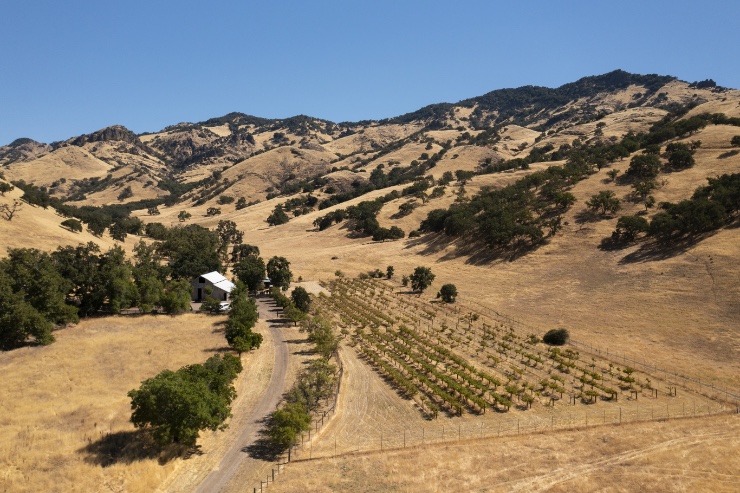
UC Santa Cruz proudly announces the establishment of the Strathearn Ranch Natural Reserve, following approval today by the UC Board of Regents. The reserve, made possible by an anonymous estate gift to the campus, will provide invaluable ecological, educational, and research opportunities for UC students, faculty, and other researchers. The 2,400-acre oak-studded grassland property in San Benito County, which has served as a cattle ranch for most of the last 100 years, becomes the 42nd reserve within the University of California’s Natural Reserve System (NRS) and the seventh UC Santa Cruz reserve.
“Natural reserves are such a special feature of our university system and of our campus,” said Chancellor Cynthia Larive. “I was fortunate to have had an early preview of the property and to have seen first-hand the beauty of the landscape and the vast research and educational opportunities it offers. I also learned what inspired the donor to entrust us with such an extraordinary place, and take seriously the responsibility of stewarding it.”
Strathearn Ranch Natural Reserve’s unique habitat, species diversity and proximity to UC Santa Cruz – it’s located just outside of Hollister, about a 90-minute drive from campus – make it an ideal location to advance the NRS mission of university-level teaching, research, and public service at protected natural areas throughout California.
The reserve will serve as a living laboratory and outdoor classroom for field courses, research projects, and hands-on learning experiences. The campus anticipates the reserve will host a variety of undergraduate and graduate-level courses, offering students the chance to study ecology, conservation biology, geology, and environmental science in a unique and diverse setting. UC Santa Cruz students in these programs will be able to stay overnight, enabling extended field trips and immersive learning experiences. The reserve’s accessibility to area K-12 schools and community colleges will provide valuable educational outreach opportunities.
“The beauty of the reserve system is the transformative impact it can have on students from all disciplines,” said Gage Dayton, director of the UC Santa Cruz Natural Reserves. “Through introductory courses, we can bring engineering students, art majors, students studying literature, ecology, astronomy, evolutionary biology, whatever, to a part of California they don’t get to see every day. By going through the process of observing nature, learning, and walking through the scientific method, students gain important skill sets like critical thinking, teamwork, making presentations, and problem-solving – skill sets that we all need to be successful in life. We are confident that the Strathearn Ranch Reserve will be a great reserve for us to fulfill that niche.”
Jerald Heisel, trustee of the landowner’s estate and contributing donor to the reserve, said he is proud to help fulfill the owner’s wishes to create the Strathearn Ranch Reserve: “Over the past 50-plus years I have had the privilege of caring for the Strathearn Ranch. I am looking forward to seeing the ranch transform from a cattle ranch to a center for learning, teaching, research, and discovery.”
The new reserve presents unique opportunities for advancing research. The reserve complements existing NRS reserves with oak woodland, providing unparalleled opportunities for multi-site and comparative studies of oak woodland ecology. The reserve’s diverse habitats, including oak savannah, chaparral, and sycamore woodland, are home to several species sensitive to environmental changes.
“The Strathearn Ranch Natural Reserve provides exciting new opportunities for research critical to the state including studies of the impacts of climate change on important oak woodland and grassland habitats across multiple scales,” said Don Croll, faculty director of the UC Santa Cruz Natural Reserve System.
The reserve’s geological features, including its volcanic history and proximity to the San Andreas Fault, offer significant research potential in geology and the earth sciences. The reserve had been used for nearly a century as a working ranch. This land-use history presents the opportunity to study grazing impacts on native flora and fauna.
The new reserve will also offer additional opportunities for the campus to collaborate with Native American groups. University leaders have a strong working relationship with the Amah Mutsun Tribal Band, whose traditional territory includes all or portions of San Benito, Monterey, Santa Cruz, Santa Clara, and San Mateo counties.
“Strathearn Ranch Natural Reserve will be here in perpetuity to help support and answer important conservation questions while providing invaluable experiential learning opportunities for students,” Dayton said. “We’ll be able to use the reserve for research, for conservation, for training our future leaders, for working with and learning from tribal and community partners, and for giving our students and community the experience of being in nature in a hands-on way.”
The landowner, who passed away earlier this year, felt very strongly the property should remain in its natural state, Dayton said. The donor was impressed by the UC Natural Reserve System – properties in their natural state with students and scientists deeply engaged in education and research.
The gift is valued between $7 million and $10 million (land and the stewardship endowment). With Regental approval of the reserve designation complete, UC representatives will now work with the estate trustee to finalize conveyance of the property to the UC Regents. That is expected to occur in 2025.
“We are honored by this extraordinary gift and the legacy it creates for the university,” said Mark Delos Reyes Davis, vice chancellor of University Advancement for UC Santa Cruz. “The Strathearn Ranch Natural Reserve, through its size, geographic diversity, and biodiversity, represents an amazing natural resource. The campus and entire UC system will benefit from this transformative gift from a donor who had an incredible vision.”


